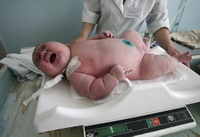Bush administration saves on medical coverage
Can Democrats stick to their words? Whom could U.S. people address to get medical coverage?

When 2007 started there was much hope concerning so widely popular State Children's Health Insurance Program. The authorities proposed a huge spending increase on the federal-state partnership. Many people and Republicans liked the idea.
But those plans wrecked. The spending increase has been vetoed twice by President Bush.
The State Children’s Health Insurance Program (SCHIP) is a national program in the United States that provides health insurance for families who earn too much money to qualify for Medicaid, yet cannot afford to buy private insurance. The program was created to address the growing number of children in the United States without health insurance. At its creation in 1997, SCHIP was the largest expansion of health insurance coverage for children in the United States since Medicaid began in the 1960s. The statutory authority for SCHIP is under title XXI of the Social Security Act. It was initially sponsored by Senator Ted Kennedy in a partnership with Senator Orrin Hatch and President Bill Clinton.
Despite SCHIP, the number of uninsured children continues to rise, particularly among families that cannot qualify for SCHIP. An October 2007 study by the Vimo Research Group found that 68.7 percent of newly uninsured children were from families 200 percent above the federal poverty level.
The first bill called for a budget increase for five years totaling $35 billion, increasing total SCHIP spending to $60 billion for the five-year period. Despite claims that it also would have increased the eligibility from couples earning up to 200% of the federal poverty level to couples earning 300% of the federal poverty level, FactCheck.org has noted that this eligibility was already possible under the old program and was not required by the new bill. The expansion of the SCHIP program was to have been funded by increasing the federal excise tax 6000% on cigars, 700% on rolling tobacco, and 160% on cigarettes, rolling papers, cigarette tubes, snuff, chewing tobacco, and pipe tobacco.
On October 3, 2007, President Bush vetoed the bill, stating that he believed it would "federalize health care", expanding the scope of SCHIP much farther than its original intent. The veto was the fourth of his administration. After his veto, Bush said he was open to a compromise that would entail more than the $5 billion originally budgeted, but would not agree to any proposal drastically expanding the number of children eligible for coverage.
Within a week of the failed veto override vote, the House passed a second bill attempting a similar expansion of SCHIP. According to Democrats, the second bill, H.R. 3963, created firmer caps on income eligibility, prevented adults from joining, and banned children of illegal immigrants from receiving benefits. The Senate passed the measure on November 1, 2007, but on December 12, 2007, Bush vetoed this bill as well, saying it was "essentially identical" to the earlier legislation.
Republican lawmakers want to work out a compromise. But many are satisfied with the extension that provides all the resources necessary to cover low-income children who need quality health insurance.
Any expansion should not allow middle-income families to drop private coverage for the public kind. SCHIP retain a new directive that makes it harder for states to cover middle-income children. The directive was severely criticized. But nothing actually was done, all the attempts failed.
The directive sounds like this: At least 95 percent of children eligible for Medicaid and SCHIP with incomes less than twice the poverty level must be enrolled in those programs.
But it’s impossible for many states to meet the conditions.
But that’s not all! The middle-income children will have to go without private coverage for a full year before they can enroll in SCHIP, and their families will have to pay premiums or co-payments that are 5 percent of their income.
This directive will require states to do the hard work of finding and enrolling poor kids before they move on to less needy families.
Subscribe to Pravda.Ru Telegram channel, Facebook, RSS!


